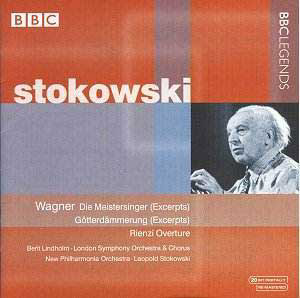We have here three nights of Stokowski’s Wagner and
much that is memorable. The conductor’s "Symphonic Syntheses"
of Wagner’s operas may have had their origin in the critical reaction
to his presentation of Parsifal in Philadelphia in 1933. The syntheses
included passages from Tristan, Das Rheingold and Die Walkure and fused
the music in a dramatically cogent way, using solo voices or else assigning
that role to an orchestral instrumentalist. So Stokowski was a by no
means inexperienced Wagnerian – on his own terms at least - when he
came to give these performances in the Royal Festival and Fairfield
Halls at the age of eighty-five. Cuttingly raw trumpets course through
the Prelude to Act 1 of The Mastersingers abetted by a very individual
woodwind patina. At 6’30 Stokowski asks for – and gets – stabbing string
accents with accompanying piping clarinets, all the while maintaining
clarity of orchestral strands; this is not some thoughtless, generalized
traversal but a properly considered one which relies much less on saturation
of sound than on structural coherence. It was in fact this work that
Stokowski had conducted at his LSO debut in 1912 over fifty years earlier.
The Prelude to the Third Act similarly enshrines qualities
of nobility and seriousness. There is rich melodic surety to the playing
– the LSO on auspicious form – with lithe strings and mellow brass,
captured in good, if not outstanding sound. Stokowski holds in balance
elements of reverence and momentum to notably fine effect and once again
those anticipating Stokowskian coagulation will have their expectations
thwarted. The Dance of the Apprentices is vivacious and frisky. Violin
entries are of defiantly brilliant articulation. Try listening to the
very start, at 0’39, where after a superbly judged pause they slash
into the texture with unanimity and passion. More felicities abound
– the cello counter theme judged to perfection, the trumpets’ staccato
juddering and finally the sonorities of almost spectral brilliance that
the conductor evokes. In the excerpt from the Entry of the Masters the
London Symphony Chorus was unexpectedly let loose – to electrifying
effect, if the performance had not already been electric enough with
its triumphant trumpets and trombones, heroic tympani and air of life
affirming joy. Plasticity of phrasing informs Siegfried’s Rhine Journey,
with its transparency and lightening of tone, its elemental elegance
negotiated with patent understanding by Stokowski. Whereas in the Funeral
Music from Götterdammerung there is a consuming and saturnine atmosphere,
yearning violins and black draped brass that rise to engulfing fervour.
Swedish Soprano Berit Lindholm was making her Royal Festival Hall debut
in Brunnhilde’s Immolation Scene. Stokowski was sufficiently impressed
to invite her to New York two years later to sing in an all-Wagner concert
at Carnegie Hall, all the more notable because she had only made her
debut in 1963. She has a richly nuanced voice, a deep dramatic soprano
with a resonant bottom extension capable of considerable projection.
She sustains the length of her scene with insight and is often unerringly
beautiful. Finally Rienzi; eloquent string phrasing, effortless gallantry
and wit, all the Stokowskian virtues with none of the supposed vices
and in rich and supportive sound. A magnificent finale to a disc that
furnishes more compelling evidence of Stokowski’s orchestral greatness.
Jonathan Woolf


